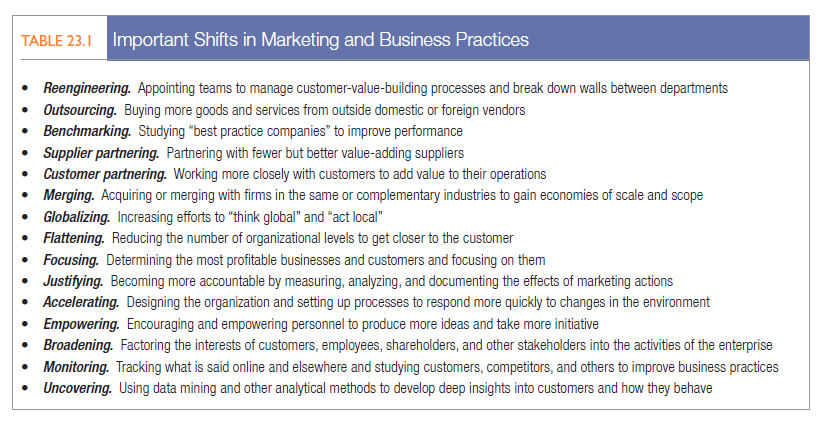With globalization, deregulation, market fragmentation, consumer empowerment, environmental concerns, and all the remarkable developments in communication technology, the world has unquestionably become a very different place for marketers.2 Table 23.1 summarizes some important shifts in marketing realities.
In making all these shifts in marketing and business practices, firms also face ethical dilemmas and perplexing trade-offs. Consumers may value convenience, but how can they justify disposable products or elaborate packaging in a world trying to minimize waste? Increasing material aspirations can defy the need for sustainability. Smart companies are creatively designing with energy efficiency, carbon footprints, toxicity, and disposability in mind. There have been some successes.3

TOYOTA PRIUS Some auto experts scoffed when Toyota predicted sales of 300,000 cars within five years of launching its gas-and-electric Prius hybrid sedan in 2001. But by 2004, the Prius had a six-month waiting list. Toyota’s winning formula consists of a powerful electric motor and the ability to quickly switch power sources—resulting in 55 miles per gallon for city and highway driving—with the roominess and power of a family sedan and an eco-friendly design and look for a little more than $20,000. Some consumers also liked that the Prius’s distinctive design allowed them to make a visible statement about their commitment to the environment. The lesson? Functionally successful products that consumers see as also being good for the environment can offer enticing options. In both 2012 and 2013, Consumer Reports rated the Toyota Prius as best overall value for the automotive dollar. Toyota is now rolling out hybrids throughout its auto lineup, and U.S. automakers have followed suit.
Now more than ever, marketers must think holistically and use creative win-win solutions to balance conflicting demands. They must develop fully integrated marketing programs and meaningful relationships with a range of constituents.4 They must do all the right things inside their company and consider the broader consequences in the marketplace, topics we turn to next.
Source: Kotler Philip T., Keller Kevin Lane (2015), Marketing Management, Pearson; 15th Edition.

Someone essentially assist to make significantly articles I would state. This is the very first time I frequented your website page and up to now? I amazed with the analysis you made to create this particular publish amazing. Magnificent job!